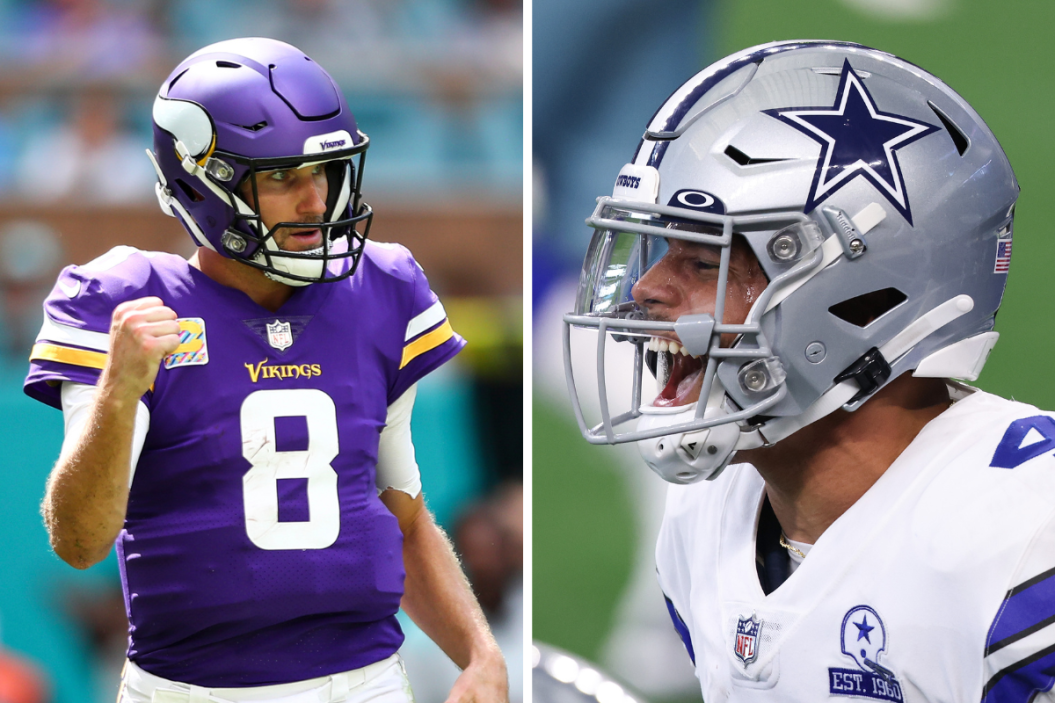The Minnesota Vikings just pulled off an overtime victory on the road in Buffalo, in what has been called the 'Game Of The Year'. The Dallas Cowboys just lost a heartbreaker in Green Bay after giving up 31 points to the struggling Packers offense. So if you're an avid NFL gambler like me (avid is the polite way of saying you live and die with every NFL Red Zone 'Witching Hour", even when a team's losses don't necessarily become wins) and you've checked out the lines ahead of this Sunday's games, it's natural that one line in particular would stand out. We're, of course, talking about the Cowboys-Vikings odds. More specifically, how are the 8-1 Vikings a home underdog against the 6-3 Cowboys? What?
Videos by FanBuzz
When lines opened on Monday morning, most sportsbooks had Dallas listed a 2 point favorite but after a surge of bets came in quickly on the Vikings, the line has since moved slightly to Dallas -1.5. But still, the Vikings are tied for the best record in football and are playing at home. Can the oddsmakers really have such little faith in them? Let's take a look at some theories about what might have caused the sportsbooks to arrive at this number and parse out which ones we can place stock into and which are a fallacy.
Theory 1: Vegas is Making it Difficult to Bet on Dallas, Because the Casual Public Always Bets on the "America's Team."
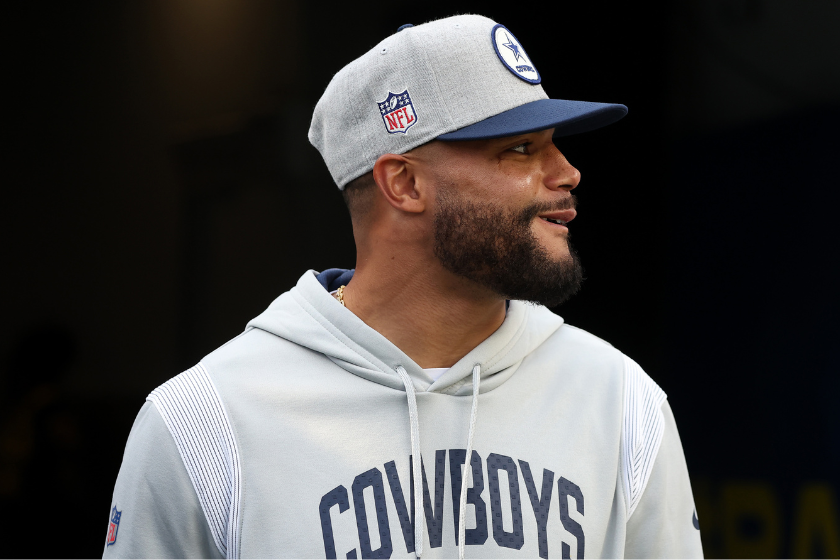
Photo by Sean M. Haffey/Getty Images
RELATED: Why are the Dallas Cowboys Called "America's Team"?
You might have heard this theory before, that the public always bets excessively on either teams with huge fan bases (like the Cowboys, Packers and Steelers) or on teams with great and popular quarterbacks (Tom Brady, Aaron Rodgers, Patrick Mahomes). If you subscribe to this theory, you believe the concept that fans want to bet on their favorite team or favorite player to win (or cover), regardless of the spread. This means that the most popular teams and players get the most "blind bets" on them to cover, so it's advantageous for a sportsbook to skew the line against them.
While there might be merit to this theory as a whole, and the Cowboys would certainly qualify as a team that receives those "blind bets of faith", when it comes to this particular contest it doesn't seem to apply. Early tracking sites are showing that roughly two-thirds of the bets coming in are on the Vikings, a number that will not be pushed back to 50% even by the popular Dallas fanbase. So we can chalk this one up to a fallacy.
Theory 2: Vegas Knows this is a "Trap Game" for the Vikings.
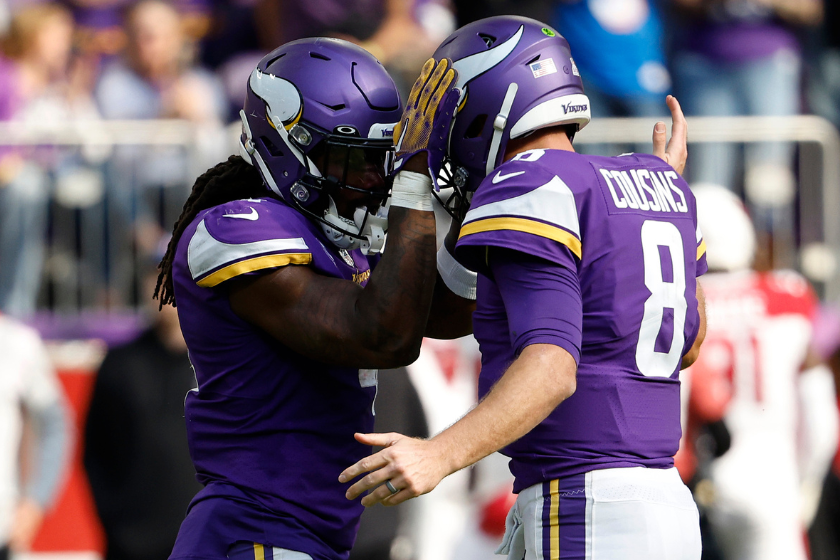
Photo by David Berding/Getty Images
The concept of a "trap game" or a "let down spot" is when a team is coming off a big win against a marquee opponent, they likely can't keep up the same energy the following week and have a disappointing performance. If you believe in this theory, then you think that Vegas suspects that the Vikings, after their hugely emotional win against the Bills, are likely to come out flat against a Cowboys team desperately looking to bounce back from their loss to the Packers. The oddsmakers have adjusted the line to account for this scenario, expecting that bettors will not, to try and entice money to be wagered on the Vikings.
While anecdotally this "trap game" concept might have some truth to it, it's much less likely that this is the intention of the bookmakers. Remember the dream for every sportsbook is to set a number that gets exactly 50% of the money on each side of the bet, so that regardless of the outcome the sportsbook makes profit based on the percentage they take with each bet. If they charge roughly a 10% markup (-110 odds) on each spread bet, which is typical, then in this exact 50/50 scenario the books would make a 10% profit no matter what.
If the sportsbooks try to entice a large amount of bets onto one team (in this case Minnesota), then sure they might win a lot if the Cowboys cover, but they will lose a large amount if the Vikings come away with a win. This is a much riskier and less enticing scenario for a sportsbook than a balanced line. So while as a gambler you can factor the "trap game" theory into your betting decisions, it's incredibly unlikely that Vegas has factored that into their line. We're going with a fallacy here.
Theory 3: This Spread is not Influenced by "Recency Bias" While our Thought Process Likely is.
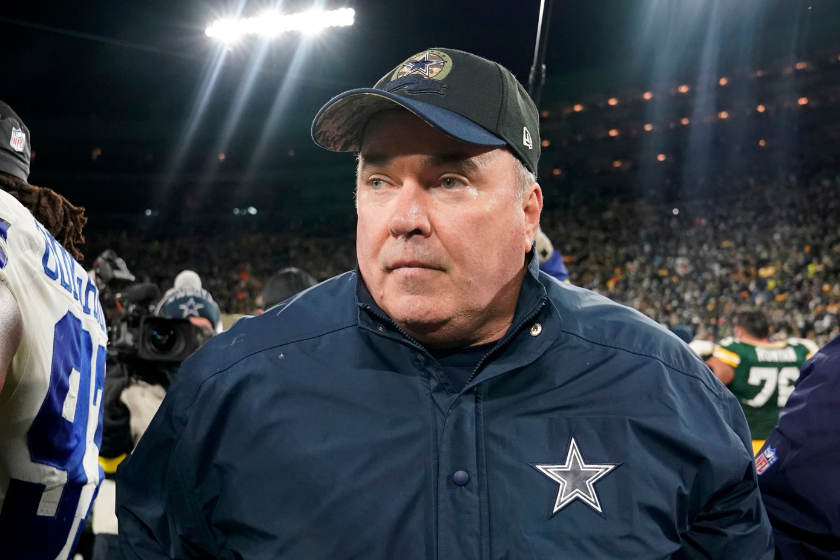
Photo by Patrick McDermott/Getty Images
RELATED: Justin Jefferson's 'Catch of the Century' Took the Air Out of Highmark Stadium
This theory means the typical fan puts more stake in what happened most recently (the Vikings win and the Cowboys loss) than the sportsbook does in their algorithm used to set the spread. A deeper dive into the numbers might prove that these two teams are closer than we'd think, and that the Cowboys might even have an edge. This theory seems very plausible and much has been written about how recency bias affects human decision making.
Here's a few numbers to consider:
- The Cowboys offense averages 30 points a game with Prescott at quarterback, five points better than the Vikings.
- Dallas is allowing only 18.2 points a game, which is 3 points less than the Vikings defense.
- The Cowboys are fourth in the league with a +47 point differential, while the Vikings are seventh at +35. This even includes when Cooper Rush filled in under center.
While there are plenty of more stats you can find, including those that favor the Vikings, the idea this theory is promoting is that the analytics used to make this line are likely built on far more information than we fans can retain in our heads, especially given the influence of recency bias. I'd gamble this is a theory we can place some stock into.
Theory 4: Kirk Cousins is Only Good in Early Games. This Kickoff is in the Midday Window.
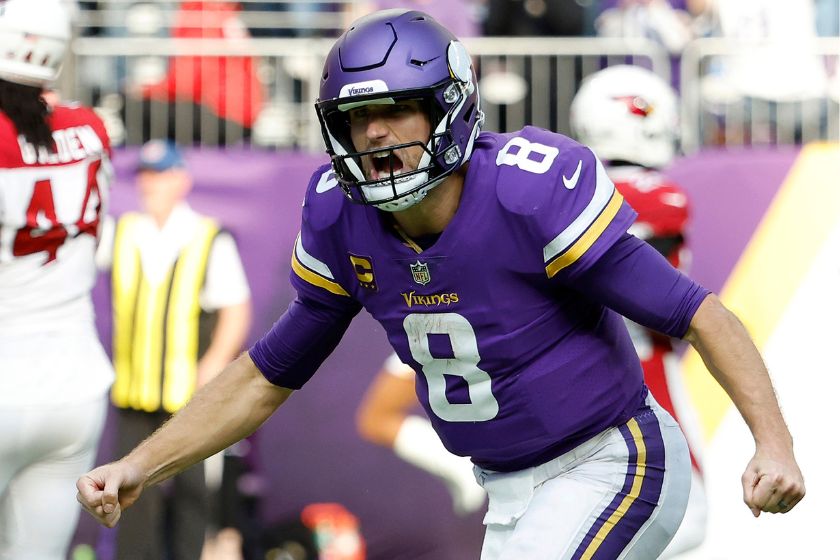
Photo by David Berding/Getty Images
RELATED: Has Kirk Cousins Evolved into the Coolest Quarterback in the NFL?
A lot has been made over the years about how bad Kirk Cousins has been in primetime games, and how good he has been at 1 p.m. However, this game takes place at 4 p.m. at home in a typical time zone for both teams. It's unlikely the start time of this game would impact the line significantly. This one is a fallacy.
Theory 5: There are Several Mismatches Dallas can Exploit. Sportsbooks Know That.
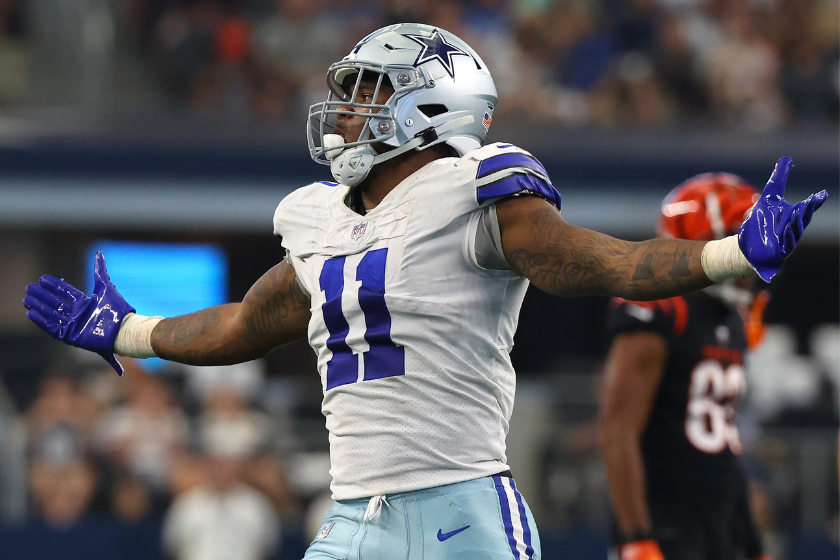
Photo by Richard Rodriguez/Getty Images
This theory would say that when analyzing the matchup, sportsbooks found significant mismatches, positional or otherwise, that favored Dallas. These mismatches showed up significantly over tons of computer simulations, which helped adjust the line to -1.5 in favor of the Cowboys even on the road.
There are several positional groupings you could see as advantageous for one team in this contest. I would expect Dallas to have a significant edge in the trenches. The Cowboys offensive line leads a vaunted rushing attack and has allowed the second fewest sacks in the league, Meanwhile the Cowboys defensive line, led by star pass rusher Micah Parsons, leads the league in sacks. They could prove difficult for the Vikings to handle on either side of the ball.The Vikings passing attack has caused problems for secondaries all season, with Justin Jefferson already over 1,000 yards receiving and the Cowboys secondary has been inconsistent at times. This is the type of matchup that can break a game, as we saw in Buffalo last week.
One particular area of the game stands out to me as a mismatch and that is the red zone. The Vikings are the second worst red zone defense in the NFL, allowing touchdowns on more than 70% of opponents trips inside the 20 yard line. Dallas is seventh in red zone scoring, and their goal line offense is even more potent since the return of dual threat QB Dak Prescott, converting for a touchdown over 83 percent of the time. The Dallas defense has held up well in the red zone this year and doesn't appear statistically outmatched by the Vikings offense. When you lump all this information together, it is likely the biggest factor to add clarity to a line that seems to strangely favor the road team. This is a theory that I can believe in.
So, Given the Cowboys-Vikings Odds, What's the Play?
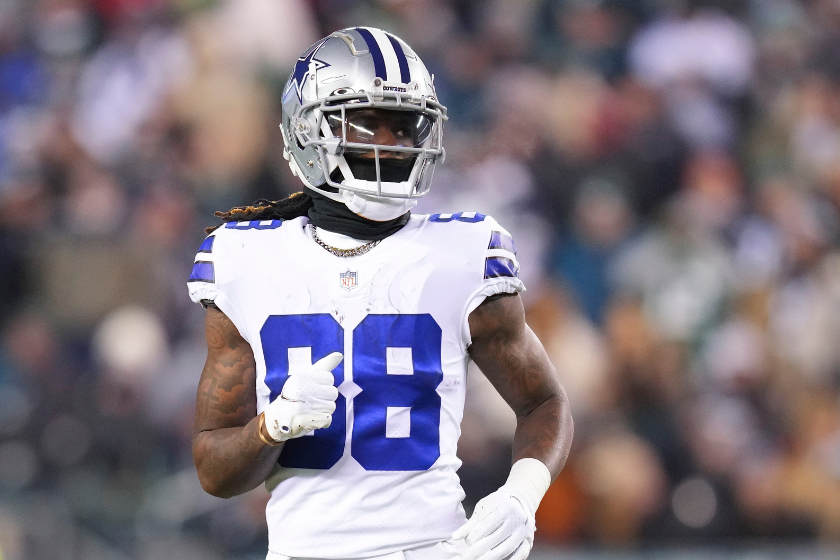
Mitchell Leff via Getty Images
The sportsbooks have Dallas as a 1.5 point favorite on the road because they do a better job of eliminating negative recency bias in their analysis than fans, not because they want to induce bets onto one side of the line or because they think Cowboys fans will flood in to bet on Dallas no matter what. In addition, their simulations have likely taken a more accurate representation of those positional and situational matchups beyond the wisdom of conventional fans that have bet on the Vikings against the spread at a 68% rate in this matchup.
While personally I do believe the Vikings are more than a fluke, they have significant issues defending in the red zone and their defense has gotten out of several jams by creating the second most turnovers in the league. If you're questioning that last detail, just see Josh Allen's fumble on the one inch line last week.
The Dallas Cowboys are too strong in the trenches for the Vikings and should be able to dominate the game with an elite running game and dominant pass rush. They say rushing and defense travels, so expect the Cowboys to get the win and the cover 28-20 this Sunday.
